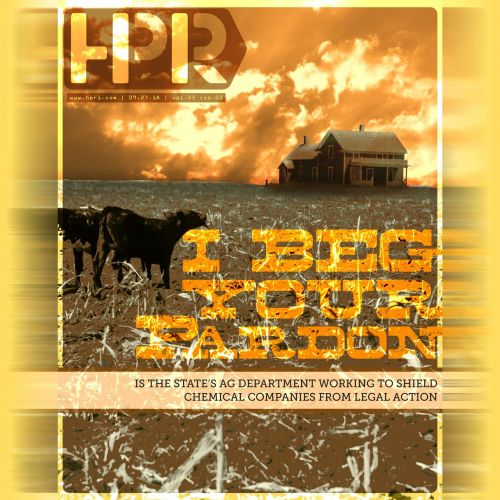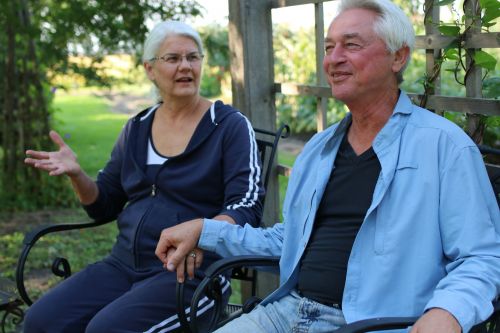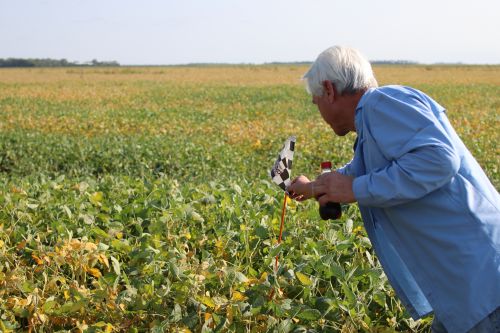News | September 27th, 2018

All Donald Heitkamp wanted in 2010 was to find the person responsible for his pesticide-destroyed crops. Instead, the farmer of wheat, corn, and soybeans in Richland County became embroiled in a battle against what he calls corruption, secretive pardons, and a state department agenda to protect big business.
Smiles still come easily to the 66-year-old farmer, despite his eight long years of fighting the system. He’s not jaded, and although his own investigations and requests for help have seen little fruition, the issue does not consume him, he said. His wife, Cathy, remained quiet, reminding him with a Post It note to be respectful while he recalled discovering a brown haze hovering over his crops on June 14, 2010.
Roundup was burning his wheat tips, he said.
“I only needed one piece of the puzzle, I had the airplane, the chemical, the only thing I needed was the name of the individual, and they’ve withheld that to this day,” Heitkamp said.
The airplane that he says illegally dumped Roundup onto a neighbor’s field was flown by a local “daredevil pilot” working for Wilber-Ellis Air, LLC, who later died in a crash after flying into a fog bank.
Adverse climate conditions forming an inversion layer, mixed with a wet two weeks creating “gumbo” soil and a slight east wind, moved the chemicals – primarily glyphosate – onto 40 acres of his fledgling wheat field, destroying them, and damaging 20 acres of corn and soybeans.
He filed a complaint with the state’s Department of Agriculture, later discovering that he was too late.

“The damage that was done to me could have been resolved to me in seven working days if Doug Goehring hadn’t pardoned the aerial sprayer and covered up for them with ‘alternative facts,’” Heitkamp said. “They make up alternative facts which is another word for lying. The negligent parties contacted the Commissioner of Agriculture, Douglas Goehring and requested administrative pardons for the negligent acts, which were then granted by the commissioner.”
Heitkamp’s losses totaled more than $100,000, half from his damaged crops, and half for legal fees and increased insurance premiums over the years since.
Barnesville attorney Zenas Baer of Zenas Baer and Associates represented Heitkamp in the civil suit against Sunrise Spraying Services, which was settled out of court. He took issue with the proper definition of Heitkamp’s word pardon, but said the connotation is real.
“It depends on your definition of pardon,” Baer said. “A pardon requires that there be some sort of conviction or penalty imposed, and absolves an individual to pay the price for wrongdoing. I’m not aware of any wrongdoing that was established and then pardoned. He is correct as it appears as though the evidence would show the applicator received a pass from the Department of Agriculture and Pesticide Control before they came out to look at the damage.”
Goehring, who is running for re-election this year, didn’t answer questions pertaining to department pardons, but said his agency, as well as the U.S. Environmental Protection Agency investigated, and could not find fault with anyone involved, because two neighbors sprayed on the same day.
“We did investigate it and in fact there was a federal investigator that came out and they did an investigation and they did not find fault,” Goehring said. “He’s saying that they found there is, I don’t know. The problem is if you have a card-carrying, badge-carrying, gun-toting federal agent and if he found somebody at fault, somebody is going to get charged.”
“He has been angry from the beginning because he was damaged, there is no doubt about that. And he was bound and determined that it was the guy to the east, which he doesn’t have a good relationship with.”
Even Goehring, agents from the EPA, and former state Agricultural Department pesticide investigator Gerald Thompson said the investigation was mishandled. Special Agent Dan O’Malley of the U.S. Environmental Protection Agency Criminal Investigation Division investigated the case, but did not press charges.
“One of my staff did something that they shouldn’t of, and it was their interpretation of the law,” Goehring said. “All documents are considered closed, in other words, you have to subpoena us to get those documents. So what happened was when he first asked for them he had them redacted.”

Damage to Heitkamp’s crops was substantial, Thompson, who worked as a field pesticide inspector for 17 years, said. His job was to review case files, and deal with citizen concerns. With an average of 50 to 80 pesticide damage complaints each year, Thompson said he reviewed hundreds of cases, and Heitkamp’s case seemed “fairly straightforward.” What bothered him the most, however, was how the North Dakota Department of Agriculture treated Heitkamp.
“The application records – there seems to be some questions about that,” Thompson said. “In my expert opinion it was mishandled.”
In 2013 the EPA report stated that records of the initial aerial spraying were missing, and that a June 20, 2010 application record made reference to the day in question, which was altered at the request of the North Dakota Department of Agriculture.
“He [neighbor Donald Klosterman Jr.] had prepared an application record for June 9, 2010, but was never asked to provide it during this investigation by…” The word was blank, but Kevin Coufal was responsible for the department’s investigation.
“He advised that during the winter of 2012/2013 he destroyed all records except for the June 20, 2010 record. EPA-CID also learned that he was not required to keep any records related to pesticide application on [blank] own land, even though he did.”
A second ground application of pesticide application from the same day reported that Joe’s Agricultural Service, to Heitkamp’s north, also sprayed near Heitkamp’s fields.
“The Heitkamps contend that the record was fabricated and no such application occurred on 6/9/10, due to the ground being saturated with water that day,” the EPA reported.
On August 16, 2010, Kevin Coufal, an investigator with the state’s Agricultural Department responsible for investigating the situation, stated that three people including Heitkamp sprayed on the day in question. The statement that was later revised by Goehring, who contends the case was not solvable as two farmers sprayed.
Due to the gumbo-like quality of the soil, no truck or farmer could have trekked into the acreage without leaving noticeable tracks, Heitkamp said. Finding no tracks in the mud made him conclude that the Roundup was sprayed by airplane, just as he and his wife saw on that day, and just as Thompson reported.
The National Weather Service reported that June 14, 2010 was a normal spring day, partly cloudy day with sporadic showers in Richland County.
“They’re ending their case on false evidence they planted,” Heitkamp said. “It’s like a policeman coming to a scene shooting a guy and then throwing down a gun saying it was self-defense.”
Thompson pointed out in his findings that the mismanaged investigation including incorrectly-drawn maps, and an inadequate analysis of soil sample, went to Coufal’s supervisors, and that the North Dakota Attorney General’s office attempted to stonewall Heitkamp during requests to reopen the case.
“Coufal continually misled Mr. Heitkamp during the course of the investigation by not answering Heitkamp’s questions in a truthful and honest manner,” Thompson said. “He basically provided false information to Mr. Heitkamp and when he told Heitkamp by telephone on June 22, 2010 that he had recovered all of the application records that pertained to the investigation. At that time, Coufal knew or should have known that he did not have all the application records at that time.”
Additionally, the state’s Attorney General’s office colluded with the Department of Agriculture on what information should and should not be disclosed to Heitkamp, according to emails between James Gray, director of the state’s Agricultural Department, Pesticide, Feed and Fertilizer Division and Charles Carvell, who worked 23 years with the Attorney General’s Division of Natural Resources and Indian Affairs.
“We conducted an investigation and verified that damage was present,” Gray stated in the February 24, 2011 email to Carvell. “We also found residues of the herbicide glyphosate in Heitkamp’s field and are confident that the glyphosate caused the damage. However, based on the pesticide application records that we gathered during our investigation, we determined at least two potential sources of that chemical. Because we can’t determine the definitive source of the chemical, we did not take legal action.
“While Heitkamp is convinced that his damage is due to a glyphosate application made east of his field, he does not know about another application made adjacent to his field that could have also caused the damage.”
Carvell gave Gray four options on how to proceed, foremost of which was: “Confident the department did a good job and the matter is closed.”
Four months later the issue was turned over to the UND conflict resolution center for mediation. The Heitkamps paid for the mediation proceedings.
 In an email to North Dakota Department of Agriculture Administrative Services Division Director Kenneth Junkert, Gray stated that he was already in contact with the UND conflict resolution center before any meeting took place.
In an email to North Dakota Department of Agriculture Administrative Services Division Director Kenneth Junkert, Gray stated that he was already in contact with the UND conflict resolution center before any meeting took place.
“Have them explain to Heitkamp the parameters of the discussions that I am willing to have next week,” Gray wrote. “I will still go through with the mediation as I have committed to do so.”
Gray arrived at the meeting late, Heitkamp told USDA Inspector Dan Hudson, and in a rush to get the proceedings over with, saying: “I’m here, but I’m not here to mediate.”
Gray is no longer with the Agricultural Department and is now the west district director for NDSU Extension Service. Gray declined to comment.
Goehring said Heitkamp is simply not satisfied with results, and wants proof that the applicator was his eastern neighbor, not the second applicator to the north.
“The person to the east he had gotten a settlement from them and what he really wanted us to do, whether he bullied him or strong-armed him, I don’t care I guess,” Goehring said. “He wanted us to fine him so that in his mind he got money from the right person, so that he felt justified.
“What the hell? I never did a damn thing to Don Heitkamp, and now he’s naming me as a co-conspirator. He’s never violated pesticide laws, he was one of the victims and he wants a different outcome. I can’t give him a different outcome because I don’t have the data to support it, that if I did what he suggested that as the agricultural commissioner I have the authority to do that, a judge would slap me so hard and so fast, because it would be arbitrary.”
“I think they did a number to try and obfuscate the issue on who was the wrongdoer in this application of pesticides,” Baer said.
“The big change”
Today, Heitkamp leases most of his land. He still plants corn for feed and ethanol. A garden filled with plump golden raspberries, sweet corn, and an apple tree are neatly tilled in his backyard. Honeybees zigzag lazily under a late summer heat wave, dancing between his chrysanthemums and a nearby soybean field.
Heitkamp, and others, claim changes have been made within the North Dakota Department of Agriculture recently that are designed to protect big business, and not the average farmer.
“Any individual who is on the receiving end of chemical drift and the loss of growing crop just is not going to get the kind of help from the North Dakota Agricultural Department or its pesticide division that would have been the case just a few years ago,” state Senator Jim Dotzenrod wrote in a letter to Heitkamp on May 14, 2017. “This has been the result of policy changed within the ND Ag Department rather than any change in state or federal law.”
The new policy, as explained to Dotzenrod, was not to get into the business of trying to determine crop loss value or what caused the loss, but to determine if the chemical application was performed legally.
“This is a big change,” Dotzenrod wrote. “I don’t believe that most farmers and owners of growing crops have any idea that this change has taken place and they may not find out until they are in the position of trying to recover from the economic loss of such damage. There are cases of chemical drift and damage every year, but the number appears to be relatively small and those impacted have few options.”
Gerald Thompson, before retiring, used to check on wind conditions, analyze soil and at least 12 crop samples for poisons, and then write a report to Bismarck headquarters after he analyzed the data. Normally, an inspector meeting would follow, and if the evidence was solid enforcement action was taken, in other words fines were levied and then the applicator at fault would sign a plea and waiver agreeing they were guilty. If they didn’t want to sign, they always had the option to go to an administrative law judge.
“After I left that’s what they became, they got into compliance assistance, their whole focus is on compliance assistance, and the penalties go to NDSU Extension Service, and they’re way down from when I was there,” Thompson said. Thompson retired as the Pesticide Enforcement Coordinator for the North Dakota Department of Agriculture in 2007.”
Before, like today, a damaged party would still have to prepare to go to court, but an Agricultural Department reported carried weight, usually discouraging the drawn-out process of a court battle.
“That would give the injured party quite a bit of standing, and the applicators would say there was no reason for us to go to court as the injured party had all the proper documentation,” Thompson said.
“The old system worked, I think compliance assistance is fine, but it’s over the line, you have to have some enforcement action to go with it.”
During his time with the department, he made mistakes, he said, but admitted them.
“When I screwed up, I said ‘God, I screwed up.’” Thompson said. “And at times I did screw up.”
Compliance assistance is a tool the EPA uses by partnering with websites, compliance guides, and training manuals and basing investigations on whether or not applicators are following application rules.
The NDSU Extension Service is an organization that specializes in science-based education keeping a pulse on statewide agricultural needs through the Citizen Advisory Council, according to its website.
Dotzenrod, a farmer who is on the North Dakota Statutory Committee, agreed about departmental changes, saying approximately 10 years ago a shift occurred in the agricultural department’s policies toward investigating pesticide misapplications. This year, Dotzenrod is challenging Goehring for his seat as the Agricultural Commissioner.
“Now, the new policy when they get a complaint they don’t get involved in estimating dollar losses, they look at the requirements of the label and try to determine who applied the questionable chemical, and they’ll try to determine if the person who applied the chemical followed the requirements on the label,” Dotzenrod said.
If an applicant did not follow instructions, the case is called an “off target,” he said.
“Some of these labels are 30 pages, 40 pages, they can be quite long,” Dotzenrod said. “There are a lot of circumstances that are covered in the label.”
The department changed investigative policies because they lacked the personnel required, Dotzenrod said, but in essence, they lifted responsibility and placed it within the court system, which in turn puts damaged parties in a difficult spot facing costly legal fees, and like Heitkamp, the possibility of increased insurance premiums.
“Since this new policy requires ‘the avenue that is open to you is the court system, that’s the appropriate place for these claims to be made.’ I think what they’ve done is said ‘We have a set of laws here to enforce, and if you follow the label, we’re not going to get involved in trying to say there are damages.’”
Goehring said no policy changes have been made in the past ten years. The department’s job isn’t to collect information on financial losses, but to determine if rules were followed.
“We aren’t involved in that process,” Goehring said. “It’s our job to enforce pesticide law, we have primacy in the state, and that means on anything, even if you live in town and you pull out a product, that means we are supposed to enforce those labels.
“We still do the same thing we did before, but there is a misconception among the public. Some farmers need us to substantiate a loss, and the reality is we aren’t there to collect for damages for your crop to any of your property. Our job is solely to enforce FIFRA, [Federal Insecticide, Fungicide, and Rodenticide Act]. We would be much like a policeman showing up for an accident, if we can find out who is at fault, according to the evidence who may be at fault, that’s what we are there to do. We’re there to investigate and enforce the law.”
Heitkamp believes the current regulatory policy of compliance assistance and the Commissioner’s “power to pardon violations” add up to a purposeful and possibly criminal withholding of insurance coverage granted by law.

“The bureaucratic mechanisms that [are] being used by the Commissioner of Agriculture to withhold this insurance and remove access to it for the citizens of North Dakota, as the law is intended, is a policy called compliance assistance… it has become obvious, over time, that this policy is not only flawed in practice, but also in philosophy.”
If Dotzenrod is elected in November, he would like to investigate the agency’s current policies, he said.
“I would prefer the policy that was in place before,” Dotzenrod said. “I think there are ways you can certainly make an estimate with the people in the agricultural department.”
Dotzenrod, while on the campaign trail, has also heard of other cases where applicators received fines of $200, but were not forced to sign plea and waiver agreement saying they were guilty of pesticide misapplications.
“To me, it’s a step backwards in the public’s ability to recover damages,” Dotzenrod said. “First of all, some of those dollars of damages are going to go to third parties, lawyers. The injured parties are never going to be made whole, they may get 50 percent.
“I would want to seriously explore what are the impediments, why can’t we go back to that policy we had before? What would obstruct this? If you’re interested in the injured party and trying to return them back to where they were, this should be the objective. It is on the list of things I want to investigate.”
Against the wind
On February 5, 2018, Heitkamp, who is a distant cousin of U.S. Senator Heidi Heitkamp, wrote to the Richland County Commissioners asking for a three-mile perimeter around his agricultural properties to ban the use of dicamba, a controversial pesticide currently legal to use in the state.
He asked for the perimeter because of an “administrative decree” issued by Goehring that stated: “pesticide spray can drift against the wind when applied next to my properties,” Heitkamp wrote.
Last year, nearly 250,000 acres of crops were damaged only by dicamba, Goehring said. When asked about the claim Goehring denied the accusation saying pesticides cannot defy the laws of science, but that strange things have occurred.
“No, but you can have situations where if the wind goes down and switches directions or you can have inversions you can have something that can end up in a different area and people will just be a bit confused,” Goehring said. “In the last few years we’ve seen some strange things happen, and people are shaking their heads asking how did that happen?”
An inversion layer is a meteorological condition that can trap chemicals and move them downwind, but winds change, topography changes, fog and low-pressure systems can alter movement patterns, and previous environmental theories are frequently being disproven, Goehring said.
“Inversions in general are just a bad thing,” Goehring said.
But Heitkamp, his attorney Zenas Baer, and Dotzenrod both said Goehring believes pesticide travel can defy the laws of physical science.
“Quantum physics is a strange breed,” Baer said. “In the quantum world you might have the possibility that those volatile little droplets of pesticide could move against the wind, but I think from a human experience standpoint, we live in the real world not the quantum world, and in the real world it is impossible for a suspended volatilized particle to propel itself against the wind. It would have to have its own propulsion system.”
“That whole process is corrupted because the legislature when they adopted the pesticide control act, according to federal statute, you have to create a pesticide control board, but when the North Dakota legislature allocated all of the authority about application and enforcement directly to the commissioner, they gave no authority the pesticide control board to hear or even repeal from an injured party,” Baer said.
“From a public policy standpoint the state could assist its citizens immensely by looking at Title 4 of the Pesticide Control Act and giving authority to the Pesticide Control Board. In their current situation there is no means to appeal an arbitrary decision from the administrators at the Department of Agriculture.”
Heitkamp has recovered from the damages done to his crops, but what is worse for him is the ongoing cover-up, he said.
“The Commissioner’s first closing of my case wrongly hinged on the false premise that someone/anyone could spray in a wet, muddy, gumbo soil field and not leave so much as a track, and in his final closing of my case he states the “spray can drift against the wind,’” Heitkamp said.
“Both of these statements are false on their face – in reality, they would qualify as faith-based administrative decrees of a person of questionable sanity. But in North Dakota, whatever the Commissioner’s decree – stands as law.”
The current philosophy, policy, and practice of North Dakota’s Agricultural Department should be “immediately stopped from use and all citizens who were subject to it during its use need to be contacted and their cases reopened and reviewed to see if they are being subject to the denial of their right to access the insurance granted to them under North Dakota law,” Heitkamp said.
“Don and Cathy Heitkamp and their attorneys made many appeals,” Thompson said in his letter. “But the answer was always the same. You should be happy with your civil damage award and leave us alone. They finally did get the EPA to do a cursory investigation, but they too informed Mr. Heitkamp to leave it alone. The Heitkamps are only asking that a government agency to do their job and do the right thing, which is to issue a report of violation to the aerial sprayer that caused their crop damage and any others that maybe have broken the law.
“There should be justice for the North Dakota citizens that are powerless against a government bureaucracy that wants to sweep their failures under the rug and to continue to boast about how important they are.”
April 18th 2024
April 18th 2024
April 18th 2024
March 21st 2024
February 15th 2024





